
The natural world needs you.
Designed for working professionals, our ecological restoration education options offer a variety of ways to advance your knowledge and skills in the field.
In these ecological restoration courses and programs—offered in partnership through UVic's School of Environmental Studies—you’ll learn about the most current restoration practices from experienced and knowledgeable instructors, surrounded by peers who share your passion for restoring disturbed and degraded ecosystems. The curriculum takes a holistic approach that recognizes the importance of both the social and biophysical dimensions of ecological restoration.
You'll learn how to:
- incorporate native species and traditional knowledge into restoration planning and design
- apply an ecosystem approach to the planning and design of restoration activities
- understand the ethics, laws and policies governing restoration work
- work with urban ecosystems and the urban/rural interface
- manage invasive species
30 years of RNS programs
Celebrate 30 years of UVic’s Restoration of Natural Systems program with events, creative challenges, restoration activities, talks, and community stories.

Ecological Restoration programs
Our ecological restoration programs are here to give you the knowledge and skills you need to restore habitats to their natural state.
| Restoration of Natural Systems (RNS) Diploma | Restoration of Natural Systems (RNS) Certificate | Ecological Restoration Professional Specialization Certificate | |
|---|---|---|---|
|
Credential |
Diploma | Certificate | Professional Specialization Certificate |
|
Core courses |
6 | 6 | 4 |
|
Elective courses |
5 | 1 | |
|
Online courses |
|||
|
5-day intensive courses |
|||
|
Program fees* |
$8,580.00 (domestic students); $33,400.00 (international students) | $5,760.00 | $3,300.00 |
|
Program length |
16 months – 6 years | 16 months – 6 years | 16 months – 2 years |
|
Entrance requirments |
3rd year undergraduate standing | 3rd year undergraduate standing | Undergraduate degree + 2 years of professional work in the field |
|
Best suited for |
Anyone interested in a career in restoration who needs a university credential in this area; or an undergrad student seeking additional specialization to their degree | Anyone interested in a career in restoration, who already has a degree and some professional experience in a related area | Professionals working in the field of landscape architecture, design, management, agrology, biology, forestry, mining, etc., and are seeking advanced training in ecological restoration |
|
More details |
View Program | View Program | View Program |
*Fees listed are estimated based on current rates
Need help choosing?
Review program choices and connect with our team through upcoming information sessions.

Discover Your Path in Sustainability
Whether you're a student or a professional looking to upskill, this free info session is a great chance to learn more, get your questions answered, and see if our programs are right for you.
Next info session: Feb. 24
Session details
Which Ecological Restoration program should I take?
Take this short quiz to find out. These questions will guide you through the eligibility guidelines for our Ecological Restoration programs.
Take QuizProgram resources
We've compiled a list of student resources for the RNS certificate and diploma programs, including websites, course planners and learning modules. Access RNS Student Resources page.
Join us on LinkedIn
Stay up to date on current information in the field of ecological restoration. Join RNS on LinkedIn
- Advanced Principles & Concepts of Ecological Restoration
- Beginner's Guide to Propagating Vegetables From Seed
- Biodiversity and Conservation Biology
- Design Principles for Natural Processes
- Drought Tolerant Gardening
- Easy Gardening
- Ecological Gardening
- Ecorestoration Strategies: Case Studies
- Ecosystem Design through Propagation of Native Plants
- Ecosystems for the Future
- Ecosystems of British Columbia, Canada, and the World
- Ethical, Legal, and Policy Aspects of Environmental Restoration
- Field Study in Ecological Restoration I
- Field Study in Ecological Restoration II
- Fire Ecology
- Forest Restoration and Sustainable Forestry
- Galiano Island Field Study
- Garden Hospitality: Welcoming the Pollinators
- Gardening with Native Plants
- Introduction to Biology and Natural History
- Introduction to Mycology
- Invasive Species and Novel Ecosystems
- Loving Our Lakes: Learning About Lakes on Vancouver Island
- Managing Mason and Leafcutter Bees
- Mapping with Drones 01 Field Day
- Mapping with Drones 02 Field Day
- Mapping with Drones 1
- Mapping with Drones 2
- Mining Reclamation
- Mushrooms of Greater Victoria
- Non-Timber Forest Management and Sustainable Use by Major Forest Zones in BC
- Nurturing a Conservation Ethic
- Plants that Earn Their Keep
- Principles and Concepts of Ecological Restoration
- Restoration Ecology
- Restoration of Freshwater Aquatic Systems
- Restoration of Marine Aquatic Systems
- Restoration of Our Past and Future: Towards a Way of Life
- Science Communication for Ecological Restoration
- Selection and Propagation of Native Plants for Ecological Restoration
- Sign-up for Discover Your Path in Sustainability at UVic
- Soil Conservation and Restoration
- Special Topics: Psychology of Transformative Climate Action
- Special Topics in Ecological Restoration: Climate Change in Ecological Restoration
- Special Topics in Environmental Restoration: Invasive Species and Novel Ecosystems
- Special Topics in Environmental Restoration: Climate Change in Ecological Restoration
- Special Topics in Environmental Restoration
- Traditional Systems of Land and Resource Management
- Urban Restoration and Sustainable Agricultural Systems
- UVic's Restoration of Natural Systems Program: What can it do for you?
- Visualizing Change in Ecological Restoration

Community Fishers Training
Community Fishers is an advanced solution using state‐of‐the‐art technology that provides a practical, user‐friendly tool for collecting data from mobile scientific instruments, which can then be managed and freely accessed via Ocean Networks Canada’s world‐leading oceanographic data management system, Oceans 2.0.
View program

Ecological Restoration
Advanced ecology training that builds on your knowledge in the field. Courses are offered online, appealing to working professionals as a means to meet their annual professional development requirements or to update their skills and understanding.
View program

Fire Ecology for Environmental Restoration
The Fire Ecology for Environmental Restoration program equips learners with practical knowledge to understand and treat the effects of fire on natural ecosystems.
View program

General Studies
This flexible certificate program allows you to customize a course of study to meet your specific learning goals.
View program

GIS Skills and Mapping
GIS technology is increasingly integrated into various industries to enhance spatial data analysis, decision-making, and planning capabilities. The program provides hands-on training in open-source software like QGIS, Google Earth and the Gaia app. You will learn to create custom maps, analyze spatial data, and answer complex human and environmental questions.
View program

Green Shores™ Training
Open to homeowners and shoreline professionals, these one- and two-day workshops provide information about the Green Shores program, including its rationale, benefits and application.
View program
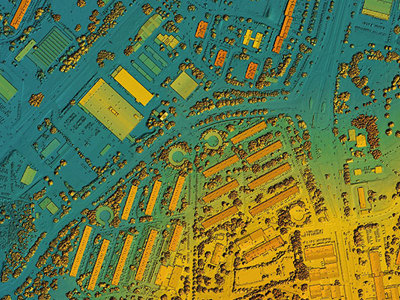
LiDAR Fundamentals for Climate Change Risk Analysis
LiDAR is a remote sensing survey method that facilitates 3D mapping of the Earth’s surface including urban and rural topography. This program equips learners to use and analyze LiDAR data for developing critical information towards mitigating the impacts of climate change.
View program

Mapping with Drones
Do you want to take your connection to our planet to new heights? Flying drones gives you the chance to navigate the Earth from above and reach new perspectives like never before.
View program

Ocean Acoustic Monitoring
Ocean acoustic monitoring empowers community members to easily contribute high-quality, continuous data on noise levels to help better understand and inform policy on the changes that may be impacting the ocean environment over time.
View program

Restoration of Natural Systems – Certificate
Knowing where we are headed, from an ecological standpoint, requires an understanding of environmental impacts and recovery strategies. The Restoration of Natural Systems program provides a bridge that connects this knowledge with the practical skills needed to solve complex restoration issues.
View program

Restoration of Natural Systems – Diploma
The Restoration of Natural Systems program provides a bridge that connects this knowledge with the practical skills needed to solve complex restoration issues. The program’s holistic approach will empower you, as someone who is passionate about the environment, to make a difference in how we connect with the natural world.
View program

Learn Geographic Information Systems (GIS) skills and mapping techniques with expert instructor Jessica Neal through UVic Continuing Studies' micro-certificate program. Transform complex data into actionable insights for environmental science, urban planning, climate response, and healthcare applications. With over 10 years of GIS teaching experience, Jessica guides students through hands-on projects that build portfolio-ready skills for high-demand careers in government, environmental consulting, and spatial data science.
Read Story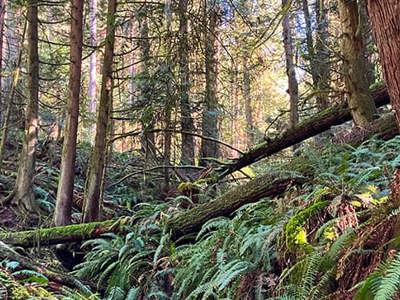
In this thoughtful piece, instructor Adam Huggins explores how ecological restoration blends science, Indigenous knowledge, and design principles to heal damaged ecosystems. Drawing on experiences from the Future Ecologies podcast and hands-on practice, he invites us to rethink our relationship with nature and envision regenerative futures rooted in collaboration and observation of natural systems.
Read Story
Creating wildfire-resilient gardens is essential in mitigating the risks posed by increasingly prevalent wildfires due to climate change. By incorporating fire-resistant plants, strategic landscaping and sustainable practices, these gardens not only protect homes and communities but also contribute to environmental conservation and long-term safety.
Read Story
Juliana McCaig, an avid appreciator of fungi, shares her thoughts and experiences after completing the Introduction to Mycology course with Continuing Studies at UVic. This popular, self-paced community course is open to learners who want to dive deeper into the world of fungi. Here’s what Juliana had to say about her experience:
Read Story
Winter 2024 Sustainability and Ecological Restoration Newsletter.
Read Story
Since the fall of 2023, Dr. Kara Shaw has led the development of two programs with Continuing Studies at UVic. The newest of the two is the Climate Action Planning program—a micro-certificate that blends policy, social justice and science so learners become empowered to implement effective and collaborative action across various communities.
Read Story
Students from the University of Victoria volunteer with the Conservation Program Branch’s Ecosystem Conservation Team to further the Parks Canada Mandate.
Read StoryThis year launches the United Nations Decade on Ecosystem Restoration. It is a rallying call for the protection and revival of ecosystems all around the world, for the benefit of people and nature. It aims to halt the degradation of ecosystems, and restore them to achieve global goals.
Read StoryThe RNS program is excited and pleased to introduce our new program director, Dr. Nancy Shackelford, who will be joining us in January 2020.
Read Story
Inspired by her work with the RNS program, Tamara Batory has initiated a pollinator garden project for her neighborhood block in the Oaklands community of Victoria, BC.
Read Story
Plans to restore a Garry Oak meadow in honour of former Metchosin councillor, Moralea Milne—who passed away suddenly in 2018—are being given a helping hand by the division's Restoration of Natural Systems (RNS) students and Program Di
Read Story
For his final RNS diploma program project, Todd Redding restored a section of mountain bike trail in the Three Blind Mice trail network near Penticton, BC. Redding planned and undertook the restoration of the trail with the support of the Penticton Area Cycling Association.
Read Story
The Restoration of Natural Systems and Ecological Restoration Programs are supported and guided by an Advisory Committee of experts who review and make recommendations to keep our programs current.
Read Story
More than half of the earth’s grasslands are degraded from nearly a century of intensive agriculture, resource extraction, and urbanization.
Read Story
Our relationship with nature is complex. We usually think in terms of taking from nature. It provides us with our needs and wants. But to be a part of nature we also need to give back. There needs to be reciprocity.
Read Story
More than half of all North American bird species are migrants, moving seasonally between their breeding and wintering grounds. In his final research project for the RNS program, Andrew Elves analyzed how artificial light in Beacon Hill Park exacerbates habitat fragmentation, interfering with the circadian rhythms of migratory birds.
Read Story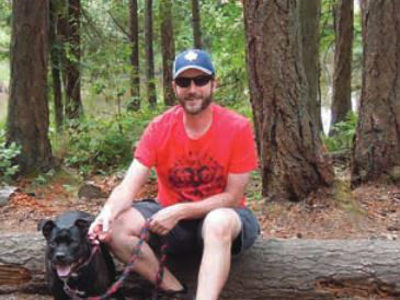
Julian enrolled in the RNS program in 2002 thinking he’d learn better ways to pull broom, but instead he learned much about planning, and especially the importance of community involvement in ecological restoration. Whenever the courses allowed, he would do his studies and reports about Cuthbert Holmes Park.
Read Story
Restoration of Natural Systems Program alumni, Wendy Kotilla, founded the Youth and Ecological Restoration Program (YER) in 2004 based on her own experiences of being surrounded by the healing powers of nature.
Read Story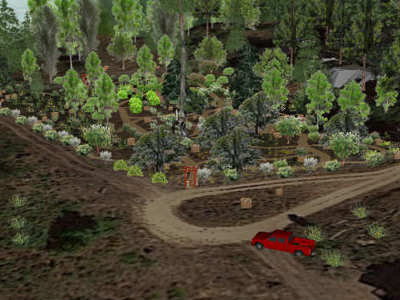
Bringing together ecological restoration and permaculture while also incorporating traditional ecological knowledge held by the Penelakut Tribe is the goal of Adam Huggins’ final project for his RNS Diploma.
Read Story
"If we are going to save environmentalism and the environment, we must also save an endangered species: the child in nature." -Richard Louv, 2005
Read Story
The University of Victoria offers two programs in ecological restoration benefitting from a partnership that brings together content expertise from the School of Environmental Studies and the sensitivity to adult learner needs and online teaching expertise from the Division of Continuing Studies.
Read Story
Ecological restoration depends critically on context. In addition to the ecological perspective, ecological restoration in cities needs to consider social and political layers that have impact on a site as well. Context for the site design is critical for a project to endure. There is no single prescription for restoration. To really work, a design requires that we understand the layers of a site’s past history, current influences — both on- and off-site and future impacts.
Read Story
2016 marks the 20 year anniversarry of our Restoration of Natural Systems (RNS) Program and we are thrilled to applaud the contribution this award-winning curriculum has been making in the field of ecological restoration since 1996.
Read Story
Dr. Emily Gonzales is an Ecological Restoration Specialist at Parks Canada where she coordinates conservation programs, develops policy and provides scientific advice for ecological restoration projects in national parks. She has also worked for Environment Canada as a Biodiversity Analyst and was the Director of Science AL!VE, a non-profit organization for science education.
Read Story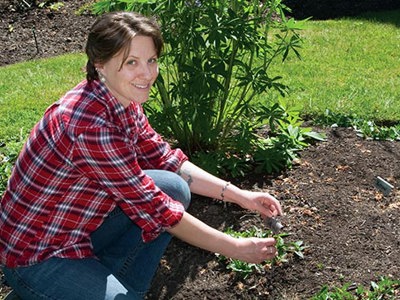
Like many in her program, Coleman works full time and is five courses into the 12-course program. As a chemist, her day job is analyzing data for an environmental laboratory in Sidney. "I wanted to know more about the environment and systems and how it all fits together," she says. "I thought this program would be a little flaky, like maybe it won't be anything I can use (in life or work). But it definitely is."
Read Story
